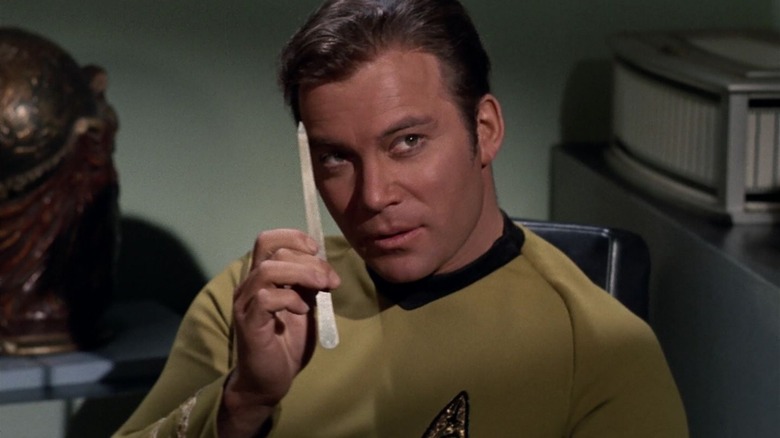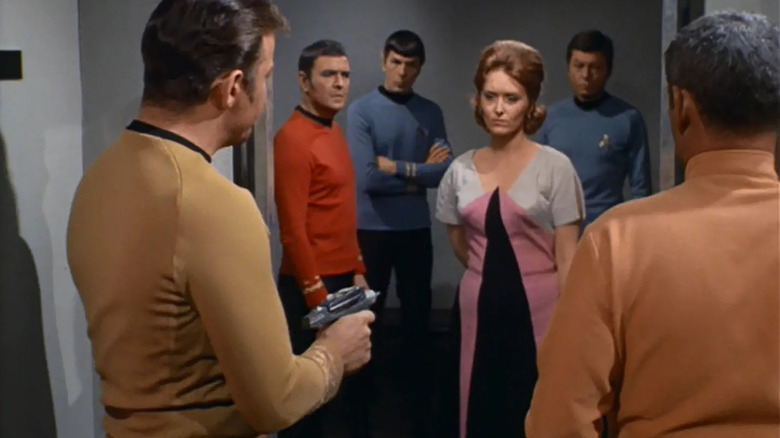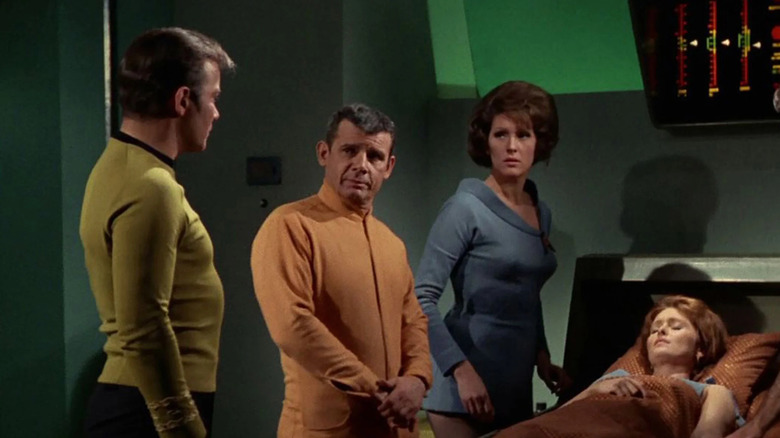How President Eisenhower's Funeral Blocked Star Trek From Winning An Emmy
The final episode of the original "Star Trek," an episode called "Turnabout Intruder," aired on June 3, 1969. It was an inauspicious end for the now-celebrated sci-fi series, as the episode was, by its very construct, blazingly sexist. In the episode, Sandra Smith played Dr. Janice Lester, an ex-lover of Captain Kirk (William Shatner) who uses an eerie new technology to shunt her consciousness into Kirk's body and put Kirk's consciousness into her own. She aims to impersonate Kirk because she was never able to attain the rank of captain herself. This is the only time in "Star Trek" history where it is said that women were, by Starfleet's own rules, not allowed to be captains. Additionally, there are several lines of dialogue about how Lester's female emotions are clearly getting in the way of her judgment, and how she resents her own sex.
This has thankfully been ignored by all modern "Star Trek" writers.
One might be tempted to see the resentment of one's imposed gender roles as a chance to criticize the way gender expectations are shaped by unfair social norms, or perhaps even see a transgender metaphor in Dr. Lester's comfort in the body of a man, but I assure readers that "Turnabout Intruder" has no progressive themes on its mind. It was clearly written for sexist reasons by sexist men. Show creator Gene Roddenberry himself wrote the story, and he was notoriously backward when it came to women.
The best thing about "Turnabout Intruder" is Shatner's performance. The premise may be icky, but Shatner gives a striking performance when he is possessed by the mind of Dr. Lester, changing his speech and mannerisms in a way that instantly communicates that he is someone else. Shatner could have received an Emmy.
But then President Eisenhower died.
Shatner's performance
Seriously, Shatner does give a legitimately good performance in "Turnabout Intruder," as does Smith, who has to play Captain Kirk for the bulk of the episode. Both actors uncannily channel each other's characters. It's the one saving grace of the episode.
According to the invaluable oral history book "The Fifty-Year Mission: The Complete, Uncensored, Unauthorized Oral History of Star Trek: The First 25 Years," edited by Mark A. Altman and Edward Gross, Shatner's performance was timed poorly. As mentioned, "Turnabout Intruder" aired on June 3, 1969. As it so happens, President Eisenhower, who served in office from 1953 to 1961, passed away on May 28, 1969, at the age of 78. Eisenhower was generally a popular president, so his passing was mourned by many. Eisenhower's funeral was a big deal, and the procession led his body onto a train that was to transport him from Washington, D.C. to Abilene, Kansas, the former president's birthplace.
According to sci-fi authors and notable Trekkies Bjo and John Trimble, Eisenhower's funeral was broadcast on the same night "Star Trek" usually aired, pre-empting the show until the following week. As it so happened, that pushed it out of the eligibility window for Emmys. In their words (spoken in disagreement with this author):
"The last third-season episode, 'Turnabout Intruder,' was very good; it might have won an Emmy for William Shatner. But all TV shows got rescheduled for President Eisenhower's funeral coverage. So the episode missed the Emmy nomination deadline."
According to the rules of the Primetime Emmy Awards, eligibility windows are from June 1 to May 31. Had "Turnabout Intruder" aired on its intended date, it would have been seen on May 27. Eisenhower pushed the show out. I don't like Ike.
Star Trek's Emmys
It should be noted that "Star Trek" did not pass its three seasons entirely without accolades, and that it did receive multiple Emmy nominations. In its first season, "Star Trek" was nominated for Outstanding Dramatic Series, Best Sound Editing, Best Photographic Visual Effects, Best Mechanical Visual Effects, and Leonard Nimoy was nominated for Best Supporting Actor. It was nominated for Outstanding Series again in 1968, and Nimoy again for Supporting Actor in 1968 and 1969. It also received five additional nominations besides. "Star Trek," however, won no Emmys.
"Star Trek: The Animated" series won the franchise its first Emmy in 1975, for Outstanding Entertainment — Children's Series.
It wouldn't be until "Star Trek: The Next Generation" that the franchise would pull in awards in earnest, as that series would — over the course of its seven seasons — be nominated for 58 Emmys and win 17. "Deep Space Nine," meanwhile, garnered 31 nominations and won four Emmys. "Voyager" was nominated for 22 and won seven Emmys, and "Enterprise" was only nominated for one Emmy as have "Lower Decks," "Strange New Worlds," and "Short Treks."
In the modern era, "Discovery" has been nominated for 10 Emmys to date, having won two, while "Picard" has raked in 11 noms (with six for its most recent season) and one win so far. The newly canceled "Prodigy" won Outstanding Individual Achievement in Animation — Production Design. All told, "Star Trek" has 33 Emmys.
Shatner never got an Emmy for "Star Trek," but in 2004, he won the award for a guest appearance on "The Practice," and then won again in 2005 for his supporting performance on "Boston Legal." Eisenhower might have delayed Shatner's chances, but he eventually got to take statues home.


